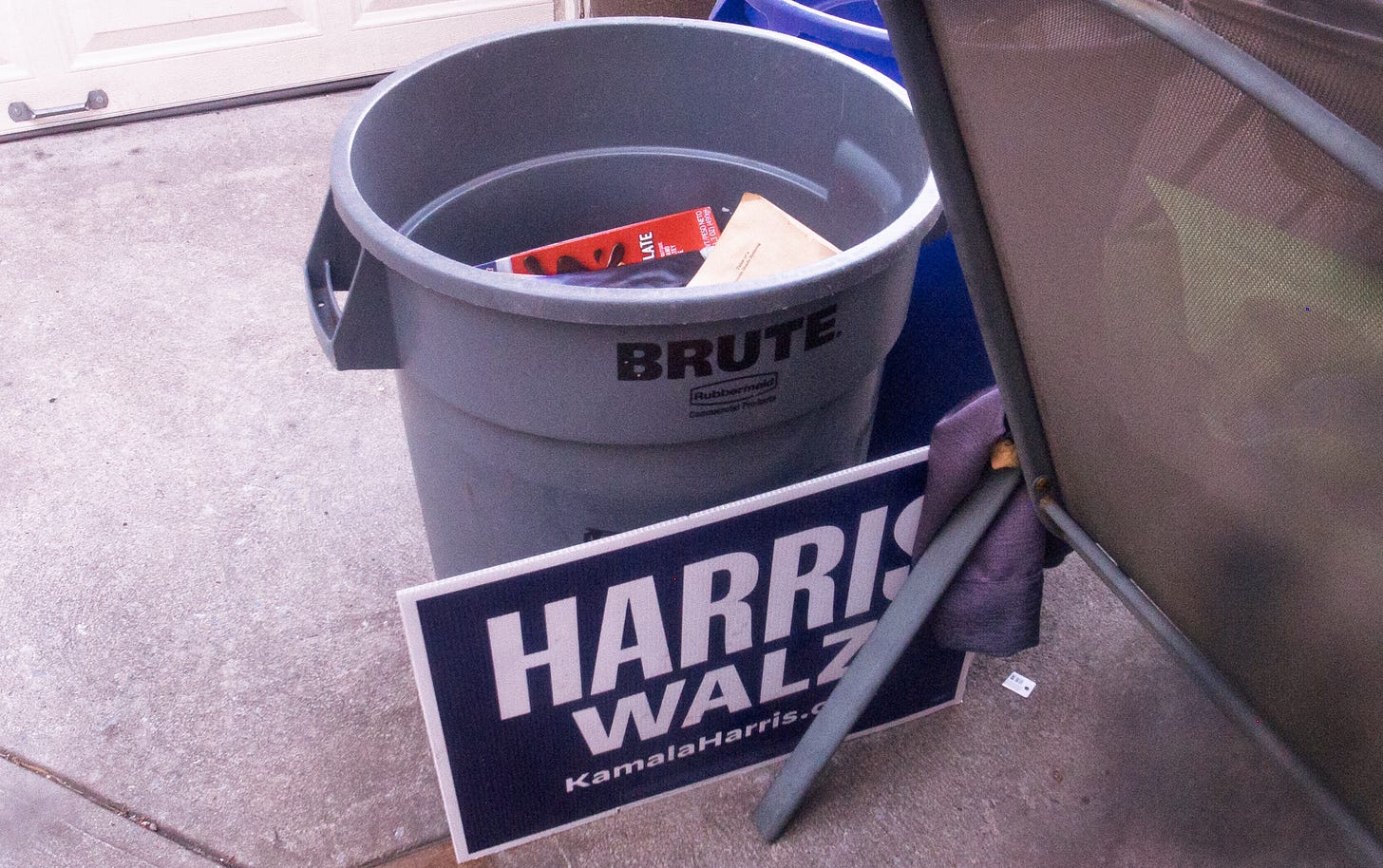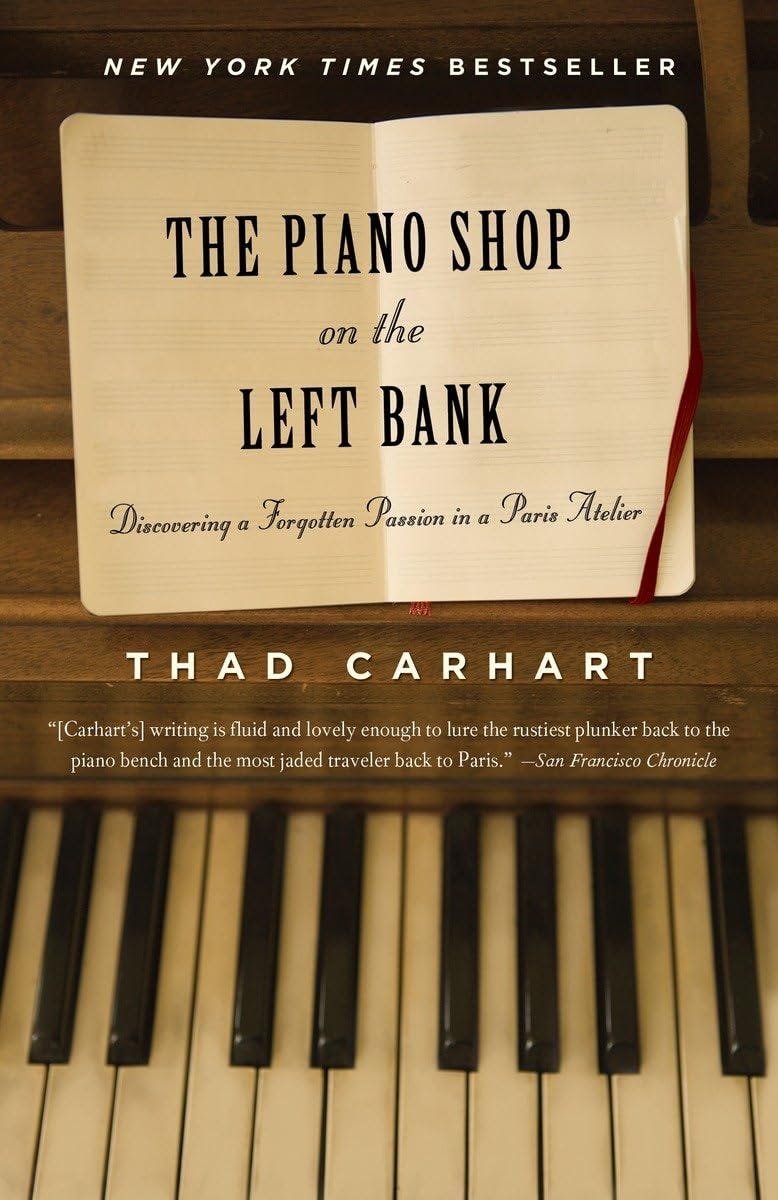It’s morning in America, a morning casting its cancerous light on a country so focused on itself that it sees nothing beyond its own nose. An America full of folks who "got theirs" and now want to pull the ladder up behind them. People who misunderstand basic economics and vote based on the price of eggs instead of the price of freedom. People who, like the dog who caught the proverbial car, now don’t know what to do with themselves.
Part of me says Trump will have another failed term, that his policies will break against the rocks of reality, and his odious claims will remain hot air. A slumlord only has so many tricks, the best being to make things uncomfortable enough for people to leave or leave him alone. That’s been his playbook since the 1970s. Why would he change now?
But there’s a deeper problem his election has exposed, something that rural America is pointing out in its own, uncomfortable way: the institutions our grandparents built are faltering in the face of new problems. My grandfather worked in the steel mills of Wheeling and had a pension. He received free healthcare, a retirement check every month, and lived in a comfortable little house on Eighth Street in Martins Ferry, a town where everyone had a couple of cars, maybe a pool, a solid library, and a few stores that catered to locals. My father was the first in his family to go to college. I was the second.
That was 1990. In 2024, that town is dead. When my grandfather came back from World War II, the town had 14,000 people. New systems were built to support those families—education, public services, healthcare. The population began to slip over time until it crashed. Today, there are 6,022 people there, earning an average of $33,000. All of the systems built to support those veterans are broken. Retail is the biggest employer in town, basically folks selling things to each other. Like some true-life Hunger Games, the only thing still bustling is the marketplace while the rest of the town is in ruins.
So yes, they have a grievance. Absolutely. The trite response is to tell them to "learn to code," but the real response should be universal basic income, free education, and free healthcare. But the systems built to support them—political, medical, economic, scientific—will never churn backward to a time when neighbors helped neighbors. The system my grandfather and his generation built promised almost guaranteed employment, and if you didn’t work, you were a drain. It was a system built to thumb its nose at the Soviet Union, sustained by the military-industrial complex and rapid population growth. That system no longer works.
So yes, let them blow things up. Let them tear down the failed systems. And yes, it will be uncomfortable… for them. Those of us who care for each other, who understand the value of giving and taxes, who live in cities where there’s more to do, see, and eat in a weekend than in an entire year in Martins Ferry, already know how to create that world. Maybe Trump is the push we need to finish the job.
Maybe.
I was reading a post by Douglass Rushkoff who has some interesting things to say on this topic. Check it out:
The political institutions that seem to be failing us now are just one symptom of a civilization whose many institutions are no longer up to the challenge of contemporary, digital life. Their inconsistencies and compromised value systems simply can’t hold up to the stresses of this time. How can we discuss border policy and immigration when the essential premise of the “nation state” is itself an intrinsically unjust construction? People who live on one side of an imaginary line are entitled to basic human rights that are to be denied those who live on the other side? No amount of policy can correct for the injustices of neoliberalism, nationalism, or colonialism. So we can’t pretend that any political solution is more than duct tape.
While a good one percent of us might choose to task ourselves with party politics at this moment, I think it’s ultimately a distraction from the matter at hand. Rather than spend all of our effort at getting the right person in a seat of power, many of us can do things that make it less important who controls the strings of government. I’m not saying it’s not important; I’m just saying that presidential politics may not be our primary means of lessening the decree.
Rather than focusing so much on the institutions that are failing us, what if we take on the functions that our institutions are failing to execute? The more engaged we are in mutual aid, the less our impoverished neighbors need to depend on the institutionalized social safety net for their food and shelter. The more we engage our troubled friends in our own and less fortunate communities, the less they will need to turn to welfare, mental health clinics, homeless shelters, and other failing national programs.
“Rather than focusing so much on the institutions that are failing us, what if we take on the functions that our institutions are failing to execute?”
That’s really hard. And it’s what we have to do.
Now, on to the books.
London Rules
Mick Herron
I hate surprises. When I watch a thriller or mystery I like to check the plot before it ends to ensure that I won’t be disappointed. I know. It’s very weird.
So when I heard that the next season of Slow Horses on Apple TV would focus on London Rules, I wanted to read it. I wasn’t disappointed. It’s a thriller about North Korea, bumbling politicians, and the power of intellect. It’s a great little thriller and I think the TV show will be amazing.
The Humorless Ladies of Border Control: Touring the Punk Underground from Belgrade to Ulaanbaatar
Franz Nicolay
Franz Nicolay is a musician who used to play for the Hold Steady and now does his own acoustic punk. In the 2010s, he did a tour of Central and Eastern Europe, hitting spots that not many had been at that point. His writing is clear and funny and the travelogue of places is punctuated with fascinating looks into some of the history and culture of places like the Balkans, Poland, and Ukraine. It’s a great little book and offers a lot of insight.
The Piano Shop on the Left Bank: Discovering a Forgotten Passion in a Paris Atelier
Thad Carhart
This is a slight little book with a simple premise: there’s a store in Paris that sells pianos. But Carhart turns this store into a microcosm of Paris life: the difficulty breaking into a social circle, the joy of creation, a wonder at folks who still love to work with their hands. If you’re looking for an escape that is actually available to you for the price of a plane ticket (and rent on an apartment on the Left Bank).







